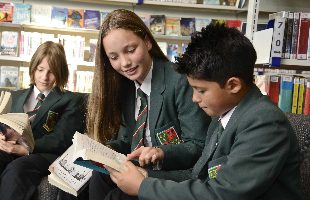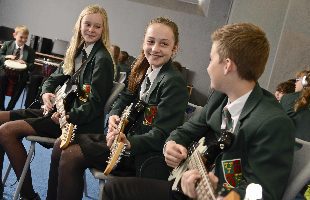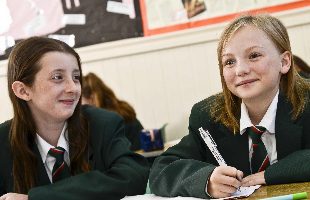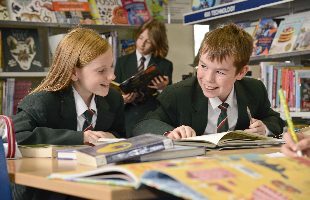Music
“Music gives a soul to the universe, wings to the mind, flight to the imagination, and life to everything.”
Plato
Year 7
The Rationale
Year seven music builds on the fundamentals of Key Stage Two including performance, composition, listening and appraising. The first unit aims to ensure all students are equipped with the skills and knowledge needed for future projects. During the year students, will develop confidence, resilience and teamwork skills through a range of performance activities. They will strength their creativity through composition and will learn the basics of music ICT.
| Autumn Term ‘Getting Started’ Project | Spring Half Term ‘Rock Band’ Project | Summer Term ‘Music and the Media’ Project | |
|---|---|---|---|
| Curriculum Knowledge | Understanding and using the musical elements including pitch, tempo, dynamics, duration, texture, timbre, silence Learning how to read notes on the treble clef Learning about different note values Learning about theme and variation Introduction to the four musical families – strings, woodwind, brass and percussion. | Learning about stringed and percussion instruments. Music analysis of Seven Nation Army by the White Stripes Developing knowledge of the musical elements further by comparing different cover versions. Learning about what makes a successful riff | Learning how tonality and the musical elements are used to compose suitable music for TV theme tunes. Learning how major and minor scales are constructed. Identifying the keys used in a range of music. Learning how to use the computer music software SoundTrap. Learning what makes a successful TV theme tune |
| Subject Skills | Rhythm dictation and notation Pitch reading and notation Keyboard technique in the right hand Singing Composition Developing confidence in performing | Developing ensemble skills by performing in small groups. Learning how to play a simple riff on a stringed instrument including the ukulele, guitar and bass guitar. Learning how to play a basic drum beat on the cajon (drum box) and drum kit. Basic singing techniques including warming up and how to look after your voice. Keyboard technique in the right hand | Performing a range of piece of music which use different tonalities. Keyboard technique Composing skills to create a number of TV theme tunes using a given brief. Using SoundTrap to manipulate and compose music. |
| How can you help your child engage with the content? | Helping your child to learn the key words and definitions of the musical elements. Listening to a range of music at home and describing what you hear. | Listen to Seven Nation Army at home. Helping support homework tasks of revising the different instrument parts of a guitar, ukulele and drum kit. Discuss and listen to Rock Bands which you grew up with. | Listen to a range of different TV theme tunes and ask your child to describe how the musical elements have been used to suit the program. Where possible, letting students have access to a computer/ tablet/ smart phone to access SoundTrap outside of the classroom. They may wish to show you their SoundTrap composition. |
| Curriculum Opportunities | School Musical Year 7 keyboard club Instrumental lessons Various extracurricular music clubs Performance opportunities e.g. Halloween concert, Festive Concert, Festive singing at local care homes | School Musical Year 7 keyboard club Year 7 Rock Band club Various extracurricular music clubs Instrumental lessons Performance opportunities including Spring Concert | School Musical Year 7 keyboard club Rock Band Club Various extracurricular music clubs Instrumental lessons Performance opportunities including the CAPA evening. |
Career Links
|
|
https://nationalcareers.service.gov.uk/search-results?searchTerm=music
|
|
|
https://www.bbc.co.uk/bitesize/careers
|
|
|
https://nationalcareers.service.gov.uk/job-profiles/classical-musician
|
Year 8
The Rationale
Year eight focusses on music from a variety of different cultures and temporal scales as well as developing more complex ensemble, rhythm and instrumental skills.
| Autumn Term ‘Music from West Africa’ Project | Spring Half Term ‘Top British Artists’ Project | Summer Term ‘Rap Music’ Project | |
|---|---|---|---|
| Curriculum content | Learning about the music and culture of West Africa. Learning about the djembe drum, its purpose, how it is played. Learning about polyrhythms, ostinatos and call and response. Listening and appraising music from a different culture. | Identifying different genres of popular music since the 1960s. Understanding and describing key characteristics of a number of British Artists. Understand how British music has developed over time. Developing the use of the musical elements. | Learning about the origins and culture of rap music. Learning the key techniques used in writing rap lyrics. Using the musical elements to analyse a range of songs. Learning how to compose a riff Students learn about the origins of rap music and will learn how to analyse song lyrics by identifying specific techniques used. They will write their own rap lyrics and create a suitable backing track using Mixcraft. They will record their lyrics on top of their backing tracks. |
| Key Skills | Learning how to play the three different djembe notes bass, tone and slap Maintaining student’s own rhythm as part of a group performance Developing rhythm dictation skills Composing their own polyrhythm and call and response and playing this as a group performance. Developing keyboard skills in the right hand and introducing the left hand. | Performing keyboard melodies with good technique. Introducing simple left hand accompaniments. Play simple patterns on the keyboard with both hands together Analyse how song melodies are constructed Singing techniques Reading notes of the treble clef Note values | Song analysis Rhythm and dictation skills Keyboard skills Lyrical writing techniques Rapping lyrics in time to a beat Using Music ICT software SoundTrap to compose a suitable backing track for students’ lyrics. Using a midi keyboard to record in students’ riff into their backing track. Using USB microphones to record in students’ rap lyrics. |
| How can you engage with your child? | Ask questions about what they have been learning about music from West Africa. Watch YouTube clips with your child of djembe drumming including https://www.youtube.com/watch?v=q5U8md4rZS8 and discuss the key characteristics. Talking about music from other cultures and countries. | Listen to British artists and have a discussion on what is heard. Talk about your own musical tastes and experience of British music. | Where possible, letting students have access to a computer/ tablet/ smart phone to access SoundTrap outside of the classroom. Supporting additional reading and listening outside of the classroom including the websites https://www.bbc.co.uk/ bitesize/topics/z3dqhyc/ articles/zvtjwty |
| Curriculum Opportunities | School Musical Various extra curricular clubs Year 8 Rock Band Group Performance opportunities e.g. Halloween concert, Festive Concert, Festive singing at local care homes Instrumental lessons | School Musical Various extra curricular clubs Year 8 Rock Band Group Performance opportunities e.g. Spring Concert Instrumental lessons | School Musical Year 8 Rock Band Club Various extra curricular music clubs Instrumental lessons Performance opportunities including the CAPA evening. |
Career Links
|
|
https://nationalcareers.service.gov.uk/search-results?searchTerm=music
|
|
|
https://www.bbc.co.uk/bitesize/careers
|
Year 9
The Rationale
Year 9 focusses on Latin and South American music and increasing complexity of skills through playing on the off beat, syncopation and more challenging ensemble work. Year 9 finishes with the most complex music ICT project, which pulls together previous skills and refining intricate editing and sound manipulation.
Music at Key Stage Three aims to develop resilience, teamwork, confidence and an appreciation for music, all which are important skills for their wellbeing and future.
| Autumn Term ‘Samba’ Project | Spring Half Term ‘Reggae Music’ | Summer Term 5 ‘Sound and Image’ Project | |
|---|---|---|---|
| Curriculum content | Learning about the culture in Brazil and the origins of Samba music. Learning about the different samba instruments and the roles they play including the surdo, repenique, caixa, tambourim and ago-go bells. Learning about the key characteristics of samba music including specific instrument technique, polyrhythms, call and response, syncopation and ostinatos. Listening and appraising music from a different culture. | Learning about the culture in Jamaica and the origins of Reggae music. Developing knowledge on how to identify major and minor chords and how they are constructed. Listening and appraising skills to a range of reggae songs. Learning how Reggae music has influenced other music. | Developing an awareness of storyboard animation and how music and image are synchronised effectively. Learning about how to compose music for films, cartoons and video games. Learning how to compose a successful Leitmotif. Developing knowledge on how the musical elements can be used effectively when composing soundtracks. |
| Key Skills | To be able to recognise and perform the sounds and rhythms of samba music. To develop existing knowledge of rhythm and time. To perform and maintain your own samba rhythm. To develop specific instrumental techniques used on the different samba instruments. To take part in a class and smaller group performances of Samba Reggae. To develop keyboard technique in the right and left hand. | To perform a chord pattern in a reggae style. To perform two different musical parts at the same time. To perform a chord progression using technique on the keyboard and ukulele/guitar. To identify and perform block, broken, om cha cha and spread chords. To perform the melody and chord patterns for Three Little Birds by Bob Marley. Composing a chord progression for a verse and chorus. | Creating a storyboard and cue sheet for a short animation. Using the musical elements to compose a soundtrack for a short animation. Using the music computer software SoundTrap to layer sounds. Composing a Leitmotif for a character and using the midi keyboards to record this into SoundTrap. To develop keyboard technique by perform a variety of soundtracks. |
| How can you engage with your child? | Talking about music from other cultures. Listening to and appraising samba music. There is a variety of online resources and video on samba music including | Talking about Reggae artists and music you have listened to. The BBC has a variety of Reggae videos and resources including | Where possible, letting students have access to a computer/ tablet/ smart phone to access SoundTrap outside of the classroom. Talking about film, cartoon and video games music an listening to examples. The BBC Bitesize has some further reading and videos at https://www.bbc.co.uk/ bitesize/topics/z3dqhyc/ articles/z7bphbk . |
| Curriculum Opportunities | School Musical Various extra curricular clubs Year 9 Rock Band Group Year 9 Samba Drumming Club Performance opportunities e.g. Halloween concert, Festive Concert, Festive singing at local care homes Instrumental lessons | School Musical Various extra curricular clubs Year 9 Rock Band Group Year 9 Samba Drumming Club Instrumental lessons Performance opportunities e.g. Spring Concert | School Musical Various extra curricular clubs Year 9 Rock Band Group Year 9 Samba Drumming Club Instrumental lessons Performance opportunities including the CAPA evening. |
Career Links
|
|
https://nationalcareers.service.gov.uk/search-results?searchTerm=music
|
|
|
https://www.bbc.co.uk/bitesize/careers
|
|
|
https://nationalcareers.service.gov.uk/job-profiles/tv-or-film-sound-technician
|






